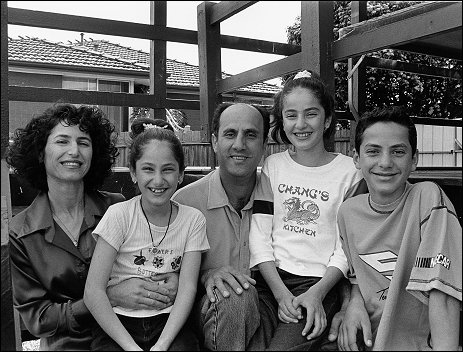Kifah and Ghanima

Photograph, Kris Reichl.
Kifah: My dream was always to study and be involved in politics in my own country - Iraq. But I wasn’t part of the ruling party in Iraq and if you don’t support the regime you are chased, gaoled and killed. Terrible things can happen to you if you express different opinions. This is the kind of life we had in Iraq.
I never really had a chance to work or study. My family owned a four-star hotel, which I managed for a short while, but we were at war for so long that everything was destroyed, first in the Iran-Iraq War and then in the Gulf War.
When the war began between Iran and Iraq, I escaped to the mountains and joined the armed struggle against the Iraqi regime. Eventually I was arrested, imprisoned and sentenced to death. But before they carried out the death penalty, the government and the opposition reached an agreement to release some political prisoners and I was one of them. After two years in gaol I was released and went into hiding again.
Ghanima: We lived in a small town called Enkawa in Kurdistan in northern Iraq, where many Chaldean people, like ourselves, live. The war between the Iraqi government and the people of Kurdistan began on Easter Sunday.
Kifah: At the time of the Gulf War the opposition parties and the people of northern Iraq rebelled against Saddam Hussein and the regime started attacking the people. Many people in the north and the south of the country escaped through the mountains to the borders of Turkey, Iran, Saudi Arabia and Syria.
We were involved in the uprising so we knew we couldn’t stay or we would be killed. I took my wife, three year-old son and two year-old daughter and we walked through the mountains for four days until we reached the Turkish border.
The Americans dropped food parcels for us, which contained ham. As Christians we enjoyed it but the many Moslems with us were forbidden to eat ham. Finally the Moslem priests gave their people special permission to eat the ham because they were so hungry.
Ghanima: We stayed in a refugee camp in Turkey for two years. It was a terrible place to live. The United Nations gave us food but there was never enough and many people starved. The camp was like a prison with a high fence. It was very crowded and the water was bad so many people became sick, particularly children and old people. I am a trained nurse so I worked in the camp. I even taught my husband to set up drips so that he could help the sick men in the camp too.
We lived in the camp for two years and my youngest daughter was born there at midnight with snow falling on our tent. It was miserable conditions and I don’t know how we survived.
Kifah: In the camp we had no idea which country would take us. The United Nations nominated our names to the Australian Embassy and we were accepted. It was a dream for me to come here because we had lived in fear for so long.
When we arrived in Australia we saw a different system and different people. Here, the government works for the people and people are mostly loving towards each other. Everything seemed beautiful to us.
But I haven’t forgotten Iraq. I have done a lot for my country: I’ve been jailed. I have twice been taken for execution. I’ve sacrificed a lot and I’ve suffered too much. I love my country but I love Australia too because here I have everything. We dreamt of having the freedom to express our opinions and when we came to Australia in 1992 we achieved a big part of that dream.
When we first arrived in Melbourne the government gave us a furnished house in Preston for three months while we looked for our own house. Friends helped us find a house and paid our bond for us. Without them it would have been much harder. .
For the first six months we didn’t have any idea how to look for work or read the newspapers. But later we found it easy to get jobs. I worked in factories and drove taxis and my wife worked as a nurse in a nursing home.
Ghanima: We worked very hard to learn English, lying awake until two or three in the morning testing each other. It was especially hard for us to learn to write because in our language we write from right to left. But we knew it was vital to learn English because we wanted to be involved in the community and enjoy life.
The Salvation Army were a great help to us when we first arrived in Melbourne. They enrolled our children in school, took us to the hospital and introduced us to some of the practicalities of life in Australia.
I have been very homesick at times. But there was no democracy and no freedom in our country. We always had to look for food and we had no electricity or heating. In winter our concrete houses were freezing and it was not good for our children.
Kifah: We are members of the Chaldean and Australian Cultural Association. We organise parties and barbeques and each year we travel to the country to see some of Victoria. We also run computer courses and recently organised swimming lessons for about forty women in the Chaldean community. In many Moslem countries women are not allowed to visit public swimming pools and therefore cannot swim.
We have achieved our dream which is to give our children a secure future far from trouble and misery. We are very proud that we are Australian citizens. One day we hope to see Iraq freed from the brutish regime.
